In this post, you are going to learn how to lose weight without starving yourself.
If you are struggling with weight loss, this guide will show you exactly what you need to focus on to see success.
Specifically, you will get 10 science-based strategies that you can start implementing today.
So if you’re ready to lose weight without feeling hungry or deprived, let’s jump right in.
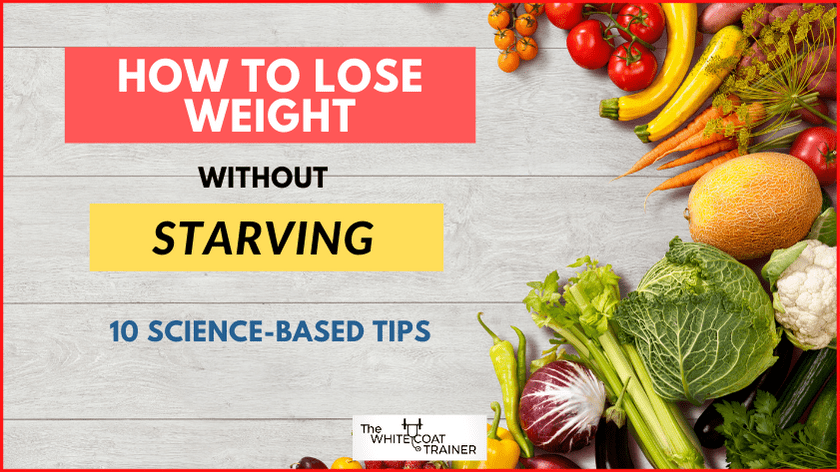
Is It Possible To Lose Weight Without Starving?
Yes, it is possible to lose weight without starving by consuming foods that are low in calories but high in satiation. In other words, you need to consume foods that are high in fiber, water, and other key nutrients.
In its simplest terms, losing weight requires you to do one thing.
You need to consume fewer calories than you are currently consuming.
The good news is, you don’t have to eat less food. In fact, that’s the opposite of what you should do.
Consuming less food is a definite way to go hungry.
Instead, you need to strategically find ways to consume fewer calories while staying satiated.
Here’s how.
How To Lose Weight Without Feeling Hungry Or Deprived (10 Tips)
The best way to lose weight without feeling hungry or deprived is to eat foods that are known to be filling, but calorie-light.
Let’s go over them now.
#1 Eat More of These Kinds of Foods
Every single food can be broken down into individual nutrients. Some foods are high in protein, some in fat, and others in carbohydrates.
Some foods also contain a lot of other micronutrients which are vitamins and minerals. This is what we call nutrient-dense food.
- The more nutrient-dense a food is, the more work your body has to do to digest it
- The more nutrient-dense a food is, the more full you will feel
- The more nutrient-dense food you eat, the more likely you will “crowd-out” nutrient-deprived, high-calorie foods out of your diet
- The more nutrient-dense food you eat, the fewer calories you will consume
- The fewer calories you consume, the more likely you will lose weight without starving
This is becoming one of the leading strategies we have to fight the obesity epidemic.
So which foods are the most nutrient-rich foods?
Keep reading.
#2 Focus On Eating The Most Important Macronutrient
Of the three macronutrients, protein has been found to have the biggest thermic effect on your body. (Study 1, 2, and 3)
This means that your body has to expend the most amount of energy digesting foods high in protein compared to carbs and fats.
The number of calories burned through digesting your food isn’t insignificant.
Some estimates say that the thermic effect of food can contribute up to 10% of your total daily energy expenditure. About 70% comes from your resting metabolic rate, and the remaining 20% comes from your activity levels.
But that’s not the only reason why protein intake is important.
Protein has also been found to be extremely satiating, which can decrease ad libitum caloric intake. (AKA eating until full)
This makes sense as we have already discussed that your body has to work hard to break down protein-rich foods.
I recommend that you get at least 20-30% of your total calorie intake from protein-based foods. If you’re not into counting calories (don’t worry I’m not either).
You can simply eat as much protein as the size of your palm 2-3 times a day as we describe in this article on dieting without counting calories.
So which foods are good protein sources?
For the animal sources
| Best Animal Sources of Protein |
|---|
| * Poultry |
| * Salmon |
| * Beef |
| * Seafood |
| * Dairy |
My wife and I are plant-based so we get our protein from mixed sources.
The best plant-based sources include
| Best Plant Based Sources of Protein |
|---|
| * Legumes (chickpeas, lentils, black beans) |
| * Nuts (almonds, walnuts, cashews) |
| * Seeds (Hemp and Chia) |
| * Edamame |
So make sure you are eating enough protein on a daily basis.
At the minimum, you should consume ~0.7 grams of lean protein per pound of body weight per day.
#3 Don’t Be Afraid Of Fat – Here Are The Ones You Need To Eat
After protein, fats are next up in order of importance.
Fats are essential for normal health. You need them for several functions including
- Hormone production
- Insulation
- Organ protection
- Cellular structures
- And Satiety
Do not be misled by all of the low-fat labels you see everywhere. Healthy fats are another great way to decrease ghrelin, the hormone responsible for hunger.
If you eat the right kinds of fats, you also get a whole host of other health benefits associated with consuming omega-3 fatty acids.
While these food groups are not calorie-light, they do pack a lot of nutrition which can help curb your appetite
The best sources of fat include:
| Best Sources of Healthy Fat |
|---|
| * Fish (salmon) |
| * Nuts (almonds, walnuts, cashews) |
| * Nut butter (peanut, almond, cashew butter) |
| * Seeds (Hemp, chia, flax) |
| * Avocados |
| * Dark Chocolate (>70%) |
| * Extra Virgin Olive Oil |
You can’t go hungry eating more protein-rich and fat-rich foods.
Your diet should be composed of approximately 20-30% of fat.
It goes over the best, worst, and “ok” foods from each macronutrient.
#4 The Most Important Micronutrient
Last but not least, it is absolutely critical that you consume adequate levels of fiber.
Fiber is the king when it comes to controlling your appetite and helping you feel full. That’s because fiber is very difficult for your body to digest quickly.
As a result, your digestion slows down, you feel full longer, and your bowel movements become more regular.
Also, fiber is a great way of controlling your blood sugar levels. Sugary foods often lead to a quick spike in blood sugar levels, followed by a crash. These crashes are often associated with hunger and increased caloric consumption.
Fiber helps regulate the rise and fall of blood sugar levels, and thus your hunger.
This is the key nutrient you need to focus on!
So which foods are high in fiber?
The first and most obvious food group is fruit.
Fruits are nature’s dessert. They provide your body with natural sugar, are loaded with several vitamins and minerals, and contain high levels of fiber.
To be honest, it really doesn’t matter what fruit you eat. Eat the ones you like. Eat them every day, a few times per day.
My personal favorites are berries – blueberries, blackberries, strawberries, and raspberries.
The other food group that you must consume is vegetables. Vegetables are the most nutrient-dense foods on the planet.
They occupy a lot of space (both on your plate and in your stomach), contain very few calories, and are packed with several micronutrients including fiber.
Just like fruit, focus on the ones you like. Eat a variety of colors. Eat them every day. Get creative.
My favorites are leafy greens – kale, spinach, and arugula.
In general, the recommendation is to consume at least 25-35 grams of fiber per day.
DO NOT IGNORE THIS STRATEGY! This is the most overlooked step in eating for weight loss.
If your goal is to lose weight, you must eat foods that are high in both water and fiber content. These foods add bulk, fill you up, and are low in calories.
#5 The Easiest Calories To Avoid
Ok, so we covered the three types of foods that you can consume to stay full. Now we will talk about a certain type of calorie to avoid.
One easy way to control the number of calories you consume is to avoid liquid calories.
Liquid calories are the easiest way to guzzle down 200-500 calories in just a few seconds. Not only is this bad for your energy balance, but liquid calories don’t slow your digestion, nor keep you satisfied.
Studies show that liquid drinks can contribute to spikes and crashes of blood sugar levels – which can lead to you feeling hungry in a short amount of time.
Also, depending on what the drink is, it may or may not even have a significant amount of nutrition. This is particularly true of juices and sodas.
Most of these drinks are composed of ’empty calories.’
Instead of drinking apple juice, just eat the apple. Instead of buying a Naked juice, just add some greens to your current meals.
The whole food is always > The liquid version.
Replace all of your liquid beverages with water. Studies have found that water is another effective way to help stay satisfied throughout that can potentially decrease your caloric intake.
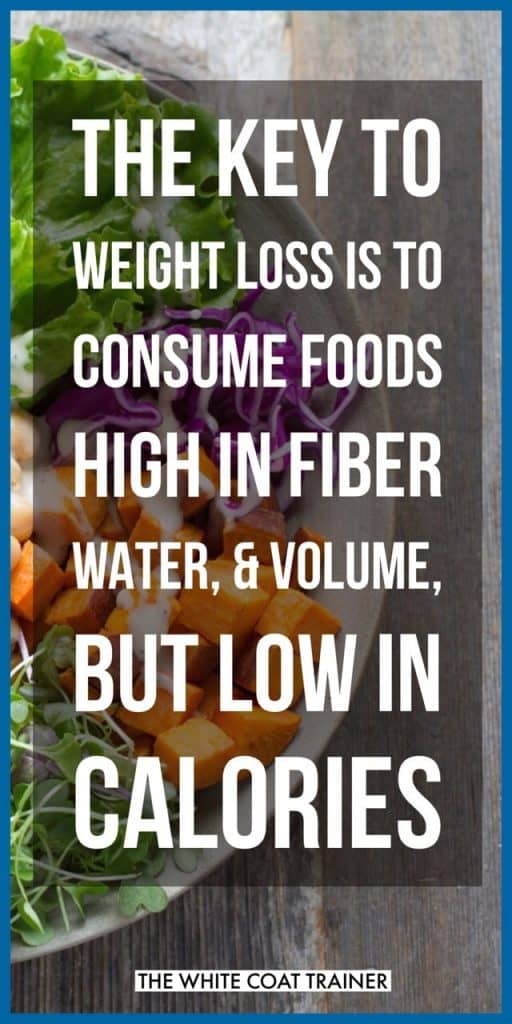
3 Bonus Strategies To Help With Your Weight Loss Journey
In this next section, we will discuss a few more strategies to help you lose weight that isn’t related to the actual diet.
Keep reading.
#6 Control Your Leptin Levels By Optimizing This One Thing
Did you know that sleep deprivation is associated with alterations in appetite?
It’s true.
I’m sure you have experienced this situation a couple of times in your life.
You are up late at night, and you just can’t seem to control your hunger. Even worse, you crave low-quality foods like sweets.
Physiologically this makes sense.
When you are sleep-deprived, your body has to come up with energy to keep you awake and focused. This is energy that would normally be spent sleeping and recovering, which is much less demanding.
But instead of diverting your energy to recuperation and anabolism, (which is what your body expects to do for 6-8 hours a night), it needs to remain catabolic to keep you alert.
As such, your body releases ghrelin to stimulate your appetite to keep your energy influx high.
So why do you crave sweets?
Because sugar is the fastest source of quick energy. Sugar is also a preferential energy source for your brain, which requires a great deal of energy to focus during times of sleep deprivation.
Listen, you don’t need any more reasons to sleep more. It is essential for optimal health.
A lack of sleep will elicit hunger responses, and increase your risk of fat gain.
If you need a few resources on how to help improve sleep, check out our articles on getting enough sleep here.
#7 Find One Way To Help Manage Stress
Everyone experiences stress on a regular basis.
We all experience it differently and have varying levels of tolerance for it. But high levels of stress are linked to numerous chronic medical conditions.
This includes obesity.
Our bodies respond to stress by releasing a hormone called cortisol in the short term. Cortisol is responsible for helping activate the “fight or flight” response.
The only time you will be fighting or fleeing is in times of danger.
During these dangerous times, your body releases epinephrine to increase your heart rate and your blood pressure. Cortisol also stimulates a chemical reaction known as gluconeogenesis to help maintain blood sugar levels.
Once the threat is over, cortisol should go back down to a normal level.
Here’s the problem.
Our bodies don’t know if we are stressed because we need to run from a threat, or because our boss yelled at us, and we have three deadlines to meet by tomorrow.
Chronic stress can lead to persistent elevations in your cortisol levels prolonging the fight or flight response.
How bad is chronically elevated cortisol?
You can see the effects in individuals with Cushing’s syndrome. They develop obesity around their trunk and their face, they have high blood pressure and suppressed immune systems.
Who knew a little stress could keep you from losing weight?
So, it is critically important that you find at least one strategy to help manage your stress.
Find one activity that you can do on a regular basis to control your stress levels. Here are my favorites
- Go outside often – see as much green as possible
- Laughing – laughing makes you feel good. Watch a rerun of your favorite sitcom
- Deep breathing – Deep breathing/meditation has clinically been proven to reduce stress and promote a sense of well-being.
- Exercising – regular physical activity releases a group of hormones called endorphins – which stimulate opiate receptors improving the way you feel
Talking about exercise ….
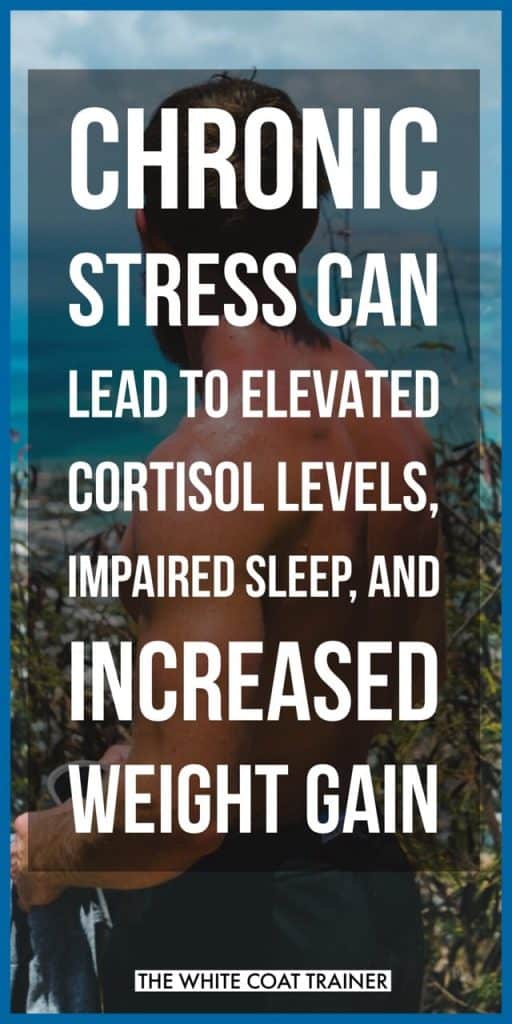
#8 Simplify Your Movement
You already know that you should be exercising.
If this knowledge is so common, why do so many people fail to do it?
It all boils down to information overload. You are constantly bombarded with hundreds of different ways to exercise. Every week there seems to be a new workout method promising varying levels of results.
I don’t know about you, but when I am presented with several choices, I sometimes get overwhelmed and do nothing. This often seems to be the case when it comes to exercise.
Exercise is not complicated. In fact, it’s actually pretty simple.
If you are someone who struggles with exercising on a consistent basis, you will benefit from simplifying your movement.
I’ll make it as simple as possible. You only need to do just one exercise. The good news is, this is the most beneficial exercise possible.
Walking.
It is an undeniable truth that your body, your very anatomy, is designed to walk.
- Before the creation of modern civilization, we had to walk to get our food.
- Before the creation of automobiles, we had to walk to get from point A to point B.
- Before the creation of Amazon Prime, we had to walk to get what we needed to live.
Movement and walking are part of our DNA.
Not P90x or Crossfit. Just movement. (Nothing against these workouts – if done correctly they are great, but I’m just trying to make a point.)
So, If you just don’t know what to do – take a 10-15 minute walk every single day.
Do it on a treadmill. Do it outside. Do it indoors. It doesn’t matter. Just move, and do it every single day.
As time goes on, this will become a part of your routine. Exercise and movement will be a normal part of your life.
Check out our full article on walking here.
#9 Increase This To Help Boost Your Metabolism
As we already discussed, weight loss requires you to burn more calories than you consume.
It is far easier to consume fewer calories than it is to burn more calories. But that’s not to say that you shouldn’t try. There is one thing that you can do to help improve your basal metabolic rate as well as your overall health.
Build more lean muscle mass.
It doesn’t matter how heavy you are. Doing some type of strength training with resistance will help strengthen and develop your muscles.
Muscle is metabolically more active than fat. This means that your body has to expend more energy maintaining muscle tissue than it does fat tissue. The difference isn’t large, but every bit can help.
Also, having more muscle tissue makes it that you will burn more calories when you do exercise. More muscle = more strength and more force production.
Lastly, having increased lean muscle mass has a host of other benefits that you cannot ignore.
It’s a win-win.
Here is our article on exercising for weight loss.
Can I Lose Weight Without Exercise?
Yes, you can lose weight without exercising.
Believe it or not, your diet will make up at least 80% of your weight loss efforts.
Exercise only affects the number of calories you burn. However, you may be glad to hear that it is much easier and more efficient to consume fewer calories than it is to burn them off.
We discuss this in much more detail in our post: Diet Vs Exercise- What’s More Important?
In fact, that’s why we created an entire step-by-step program that teaches you how to diet by making small changes to your daily nutrition.
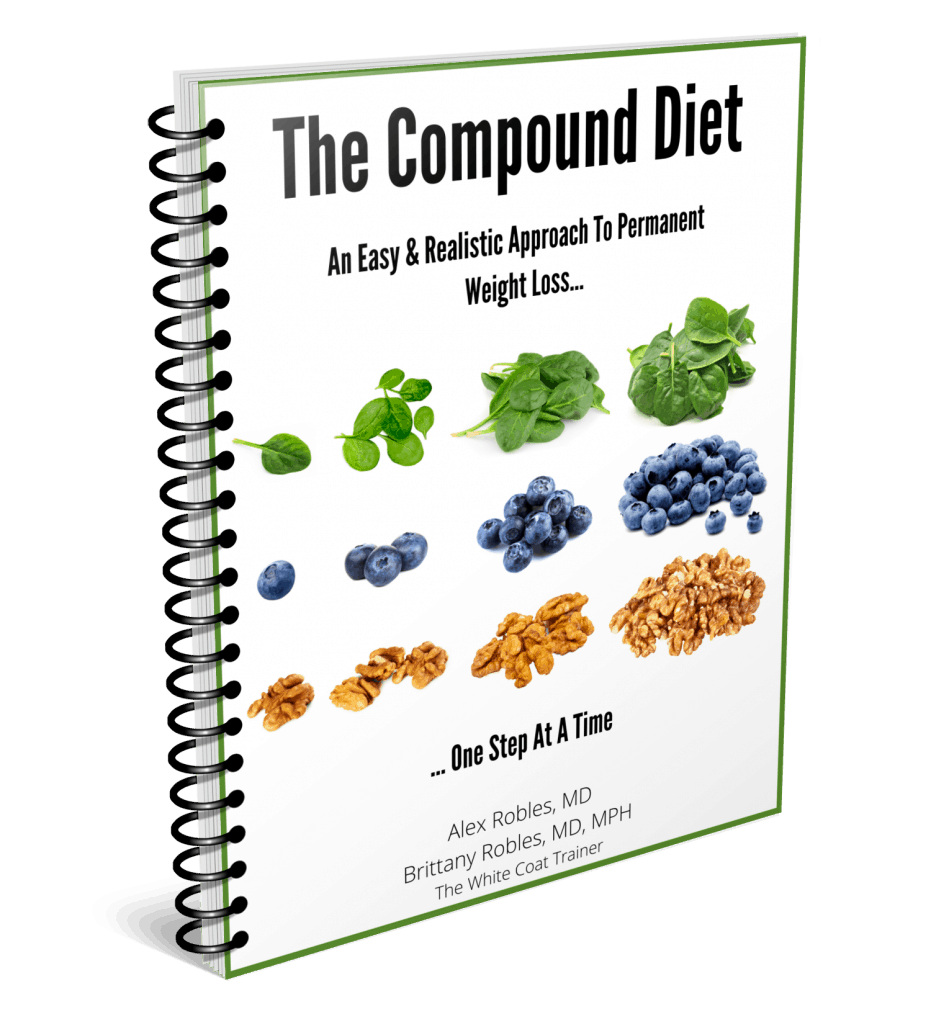
The Compound Diet focuses on realistic and sustainable strategies to form long term habits.
#10 Consider Going On A Break Once In Awhile
For the 10th and final strategy, you can consider taking a diet break every so often.
What’s a diet break?
A diet break is when you purposely increase your caloric intake back to a higher level for a short amount of time. Studies have shown that you can lose just as much weight by pausing your diet for as long as 2 weeks every 2 weeks when compared to someone who diets continuously for the same amount of time.
Obviously, the overall time to weight loss is longer if you take a break every 2 weeks, but there are certainly benefits to doing this.
The benefits of a diet break are obvious
- it allows you to enjoy calorically dense foods while on a break
- it provides mental relief
- it allows your body to temporarily reverse the metabolic effects of a caloric deficit
Overall, if you would like to do a diet break, I would recommend no sooner than every 4 weeks.
Putting It All Together: How to Diet Without Starving
Okay, so now you know everything you need to know to lose weight without feeling hungry.
But how do you take all of this information and create a plan that will work for you?
Here’s what to do:
Create a list of
- 5 fruits that you enjoy
- 5 vegetables that you enjoy (or at least don’t mind)
- 5 protein sources that you enjoy
- 5 fat sources that you enjoy
- 3 sources of liquid calories that you consume regularly
Feel free to choose from the list of foods I have provided above.
As simple as this exercise was – you have just come up with the vast majority of the foods you should consume on your weight loss journey.
Next, you are going to:
Create a list of
- 5 high fiber carbohydrate sources that you enjoy
These include whole grains, tubers, and legumes.
| Best Sources of Healthy Carbs |
|---|
| * Oats |
| * Quinoa |
| * Brown Rice |
| * Millet |
| * Farro |
| * Potatoes |
| * Sweet Potatoes |
| * Beans |
Now, all you have to do is ensure that you consume at least 1 food from each of the 5 groups of foods you listed above on a daily basis.
It may be difficult to do at first, and you don’t have to consume every single type of food right from day one. The goal is to slowly work your way up to consuming something from each category on a daily basis.
Once you feel comfortable, continue increasing your servings of fruits and vegetables.
I also want you to consume fewer and fewer servings of liquid calories on a daily basis. Start off with the drinks you are least likely to miss.
That is all. It’s that simple.
This certainly isn’t the fastest way to lose excess fat, but it is certainly a sustainable way to do it.
Don’t forget temporary changes lead to temporary results. We want this to be a permanent change for you.
Other Related Questions
Why Do I Get Hungry When I Diet?
The sensation of hunger is created by a hormone called ghrelin.
Ghrelin is really important to your existence because its main purpose is to prevent you from starving.
Starvation is never normal. Your body interprets hunger signals as an emergency.
If you are hungry every day, your body doesn’t know if you are hungry because you want to lose weight, or you are hungry because there is a food shortage.
Your body doesn’t care about losing weight. Weight loss is not a priority. All your body cares about is survival.
So what does your body do?
It increases ghrelin to make you uncomfortably hungry, and it slows down its metabolism to conserve energy.
This is known as metabolic adaptation.
In contrast, your body secretes a hormone named leptin whenever you are satisfied. Leptin and ghrelin are polar opposites.
Studies have shown that obese people may actually have an altered response to leptin, and are leptin resistant.
If you don’t have sufficient levels of leptin or have leptin resistance, you won’t feel satisfied.
If you don’t feel satisfied, you are more likely to eat more calories than you really need.
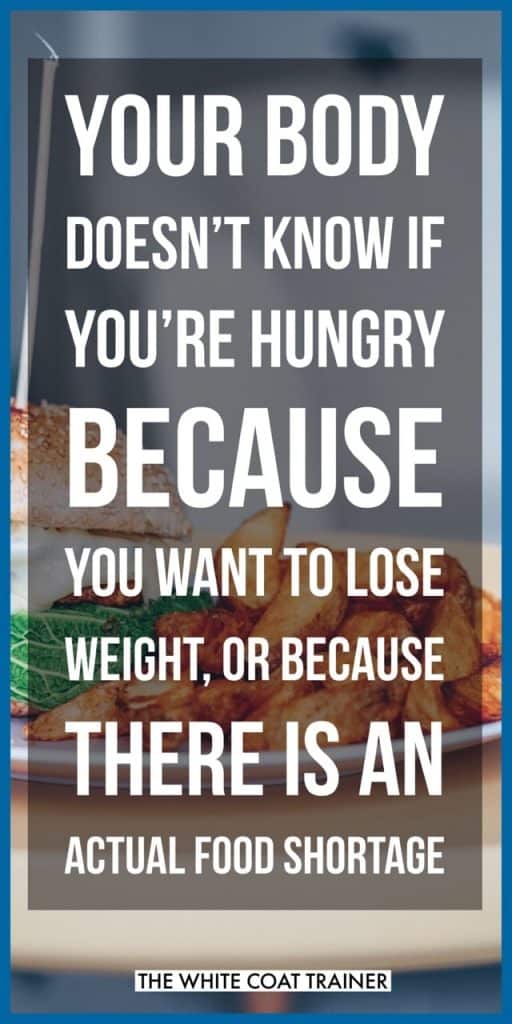
Does Being Hungry Mean You’re Losing Weight?
Hunger by itself does not mean you are losing weight. In fact, many people who are obese are constantly hungry because they have an altered hormonal response to hunger and satiation.
Will I Lose Weight If I Go To Bed Hungry?
If you focus on consuming a well-balanced nutrient-rich diet throughout the day, you may lose weight by going to bed a little hungry. With that said, you want to ensure that you are eating enough calories to promote health and avoid high levels of hunger which can disrupt your sleep.
What Meal Should I Skip To Lose Weight?
You do not have to skip any meals to lose weight as long as you are in a proper caloric deficit throughout the day.
There isn’t clear evidence that eating or skipping breakfast has any effect on weight loss. It also depends on what you choose to eat for breakfast.
However, you can experiment with skipping breakfast if you desire, a process known as intermittent fasting.
Final Words On How To Lose Weight Without Being Hungry
Any extra calories you consume will be stored for later use in the form of fat.
This is an evolutionary masterpiece if you think about it. Your body stores fat in case of an emergency like a famine.
Thankfully, famines are unlikely, but your biology doesn’t know that. If there is ever a food shortage, your body can dip into its body fat stores to make up the difference for the energy it needs.
So what does this all mean?
It means that you must consume fewer calories than your body burns so that you can be in a calorie deficit.
This will force your body to use up its stored energy.
The problem is, calorie deficits tend to make you hungry. But you now have a plan on how to diet without being hungry.
That’s all we have today.
What did you think? Which of these strategies do you think will help you most in the long run?
Let us know by leaving a comment below.
Next, You Should Read:
- Diet Vs Exercise: What Matters Most?
- How To Stop Counting Calories – Do This 1 Thing Instead
- How Often Should You Eat?

Alex Robles, MD, CPT / Brittany Robles, MD, MPH, CPT
Alex & Brittany Robles are physicians, NASM Certified Personal Trainers, and founders of The White Coat Trainer: a resource dedicated to improving the health and fitness of busy professionals using time-efficient strategies. Their advice has been featured in My Fitness Pal, Prevention, Livestrong, Reader’s Digest, Bustle, The Active Times, and more. Learn more about them here.
References:
- Dulloo, Abdul G., and Jean Jacquet. “Adaptive reduction in basal metabolic rate in response to food deprivation in humans: a role for feedback signals from fat stores.” The American journal of clinical nutrition 68.3 (1998): 599-606.
- Van Kleef, Ellen, et al. “Successful development of satiety enhancing food products: towards a multidisciplinary agenda of research challenges.” Critical reviews in food science and nutrition 52.7 (2012): 611-628.
- Jung, Chang Hee, and Min-Seon Kim. “Molecular mechanisms of central leptin resistance in obesity.” Archives of pharmacal research 36.2 (2013): 201-207.
- Halton, Thomas L., and Frank B. Hu. “The effects of high protein diets on thermogenesis, satiety and weight loss: a critical review.” Journal of the American College of Nutrition23.5 (2004): 373-385.
- Johnston, Carol S., Carol S. Day, and Pamela D. Swan. “Postprandial thermogenesis is increased 100% on a high-protein, low-fat diet versus a high-carbohydrate, low-fat diet in healthy, young women.” Journal of the American College of Nutrition 21.1 (2002): 55-61.
- Westerterp, Klaas R. “Diet induced thermogenesis.” Nutrition & metabolism 1.1 (2004): 5.
- Weigle, David S., et al. “A high-protein diet induces sustained reductions in appetite, ad libitum caloric intake, and body weight despite compensatory changes in diurnal plasma leptin and ghrelin concentrations–.” The American journal of clinical nutrition 82.1 (2005): 41-48.
- Jeong, Ji Na. “Effect of Pre-meal Water Consumption on Energy Intake and Satiety in Non-obese Young Adults.” Clinical nutrition research 7.4 (2018): 291-296.
- Spiegel, Karine, et al. “Leptin levels are dependent on sleep duration: relationships with sympathovagal balance, carbohydrate regulation, cortisol, and thyrotropin.” The Journal of clinical endocrinology & metabolism 89.11 (2004): 5762-5771.
- Harber, Victoria J., and John R. Sutton. “Endorphins and exercise.” Sports Medicine 1.2 (1984): 154-171.
- Byrne, Nuala M., et al. “Intermittent energy restriction improves weight loss efficiency in obese men: the MATADOR study.” International journal of obesity 42.2 (2018): 129.
